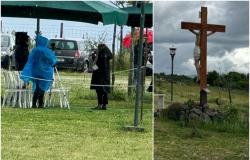Nominated for the Strega award “Dalla Same Side You Will Find Me” by Valentina Mira – as only true literature can do – breaks the silence on the events of Acca Larentia and on Mario Scrocca. She does it courageously, with a lifelong pursuit. The attacks and threats that Mira is receiving from the right are unacceptable
On the same side you will find me, Valentina Mira’s second novel published by Sem, is among the dozen finalists of the Strega prize. It brought fame to the young writer, but also attacks from right-wing exponents and magazines close to Casa Pound, and now even death threats. It is a political book, as Mario Sechi wanted the author to reiterate during the La7 broadcast Half past eight of April 12th
But the Divine Comedy Isn’t it a political book? I hope no one wants to discuss the artistic value of the poem whose sixth canto of each cantica is explicitly political, which we have all studied and of which we remember the scholastic definition: «didactic-allegorical poem, it aims to teach the great moral and religious truths through the use of images that have symbolic meaning”. It is no coincidence that the Minister of Culture Gennaro Sangiuliano identified Dante as the founder of right-wing thought in Italy (read the article by Noemi Ghetti on Left online on 26 January Dante was indeed a conservative but stop exchanging history with the phantoms of history). Then Machiavelli and even Gramsci were also subjected to attempts at appropriation with the aim of building a cultural hegemony of the right.
Therefore the dispute over the legitimacy of the nomination of a ‘political book’ like that of Valentina Mira for a literary prize would remain a question of goat’s wool – after all, if one aspires to cultural hegemony one should at least remember Aristotle’s zoon politikon! – if we were not in the historical moment in which the opera institutions, the permanent theatres, the museums, the public information spaces, are under siege to install new management faithful to the line, and the Rai is transformed with the ‘revision’ of the level playing field in a “megaphone” of the right in government, as rightly denounced in the UsigRai statement read by journalists at the end of the evening news broadcasts of all the networks on 12 April.
And now books and their authors, intellectuals in general are also under attack – and all human beings are, “homo faber cannot be separated from homo sapiens”, wrote Gramsci. The historian and philologist Luciano Canfora, “dangerous subversive” as Professor Mario Lentano defines him in a post of brilliant irony, the philosopher Donatella Di Cesare and Tomaso Montanari sent to trial following a complaint from Giorgia Meloni and the minister Lollobrigida respectively, Davide Conti sued from Rauti (here is the video of their joint press conference with the Fnsi ed.) Antonio Scurati, author of the famous trilogy on Mussolini, purged from the Rai broadcast What will be: he should have read his monologue on the Liberation in view of April 25th. Rai denies that it is censorship, to prove it the Prime Minister published the full text of the monologue in a post (which has since gone viral) with specious and unsustainable arguments about Scurati. In the evening Serena Bortone read the monologue given to her by Scurati a What will be (Rai3, 20 April). Nicola Lagioia, winner of a Strega award with La ferocia and former director of the Turin Book Fair, elegantly writes in an appeal launched online, «when the context becomes so petty as to suggest that you keep silent for a quiet life , that’s exactly when we need to talk.”
Gratitude and solidarity with Valentina Mira, then, a young anti-fascist and feminist woman, threatened with death for having written a book about «a victim of series Z, Mario Scrocca, who was accused of the double murder of Acca Larentia in ’78, almost ten years later, on the basis of a very shaky testimony (…), and 36 hours after the arrest he was found hanged in an anti-hanging cell of the Regina Coeli prison”: I quote Mira herself, who said on TV that the book was born from his meeting with Rossella Scarponi, widow of Mario Scrocca at just 25 years old, with whom he had had a son, Tiziano, 2 years old when his father died, and from the need to restore to this family if not justice, which by now it’s too late, at least interest, “care”. She informs us The Century of Italy (11 April) which Federico Mollicone, president of the culture commission of the Chamber of Deputies, after meticulous examination – but will it be his institutional task, perhaps also for each book nominated for a literary prize? -, defines Valentina Mira’s novel as “a screenplay for some bad fiction”, and we continue to discuss whether it is not instead faction, or in less derogatory terms, biased narration, historical revisionism.
Having read the book, little remains of all this, the historical facts that the novel – and I underline novel, because during reading any doubt that it is vanishes – honestly tells how they happened: the laying of flowers in Acca Larentia by Giorgia Meloni , in 2008, between the outstretched arms and the chants praising Mussolini, the total lack of evidence not only of the guilt but also of the suicide of Mario Scrocca. The reconstruction is documented and accurate. The literary licenses are equally honestly declared, as when in the notes for the reader the writer warns that the story of the unexpected arrival after many years of the copy sent by an anonymous person of the minutes of Mario Scrocca’s interrogations in prison, and therefore also the content of those reports are the fruit of imagination: not of hers, but of Rossella’s, who wrote her own book, Alone alone, as Tiziano and her were for years. Mira discovers this late, after having already finished writing, from Rossella, but decides to leave that scene as it is because hers “remains a novel and not an essay” and so that the reader is left with “a sense of injustice”, which however is not overwhelming, because it believes “in the power of books and of breaking certain silences and breaking certain taboos”. So that hope remains alive.
On the same side you will find me, as only true literature can do, it breaks the silence, and not only on Mario Scrocca and around his loved ones, but for all of us. She does it courageously, with the search of a life, of the writer’s own life, with a lashing style, with a tight parataxis, as the author herself recognizes, and provocative, but never spiteful, as some detractors have insinuated. It is a historical novel and at the same time an autobiography, despite the time gap between her young life and the story she tells. That story belongs to her too, profoundly, because it belongs to every woman who wants to discover where men’s violence comes from. In writing lessons, Valentina Mira says, “they tell you that you must never lose sight of why you are writing what you are writing.” And she knows it, throughout the book: it is not the sense of sisterhood that her meeting with Rossella made her discover, not even just the sense of justice in the face of the injustice of Mario’s story. «You are dealing with something more difficult to express. Partly with a sort of guilt to atone for: fascism in and around me. My ex, my small and big compromises for a shred of love (…) because I was tired and then everything was fine, even someone who says “Long live the duce””, she writes in the chapter The heart in these pages. And in the chapter Liberation, from “his” fascist, the one who understood – because he recognized violence well, certainly not out of sensitivity – his story, the rape suffered by another fascist with the Celtic cross around his neck, and told her “with the sweetness false that certain pedophile priests must have”, “I forgive you”, he finally writes the words he was unable to say: “I don’t forgive you and I will never forgive you”. That’s why Mira writes. «To try to provide antibodies». Antibodies against Denialtitle of the chapter in which she clashes with the reversal of the truth of her former fascist who accuses her, the victim, of being the executioner, as happens publicly today in our country: private denial, state denialism.
This novel, its profound honest passionate humanity, is truly a good dose of antibodies against the cancellation of history.
Tags: power novels defeat death




